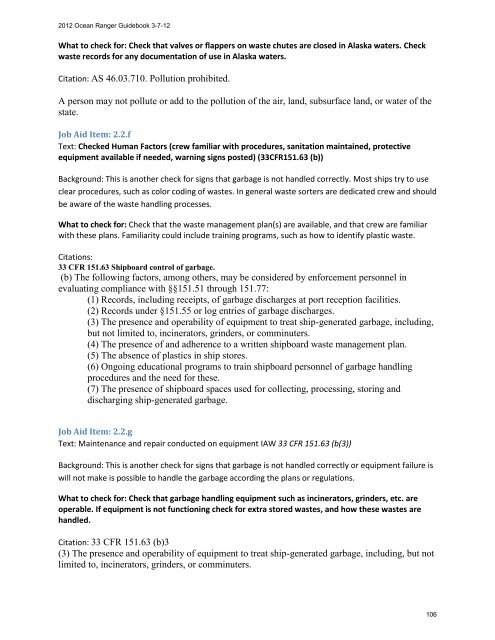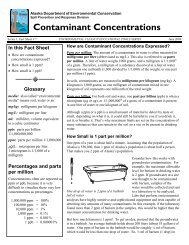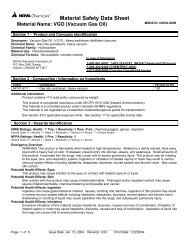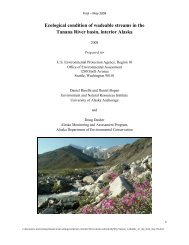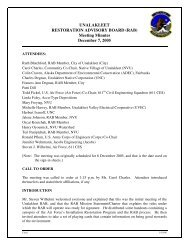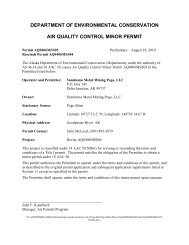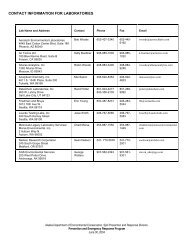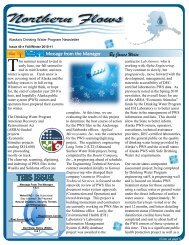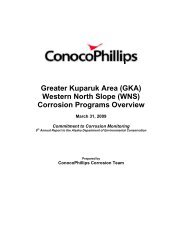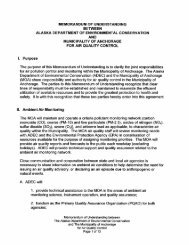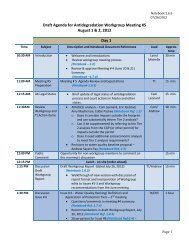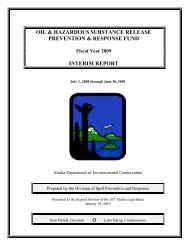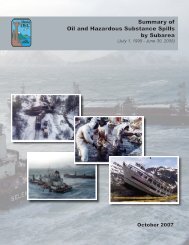2012 Ocean Ranger Guidebook Revision 3-7-12 - Alaska ...
2012 Ocean Ranger Guidebook Revision 3-7-12 - Alaska ...
2012 Ocean Ranger Guidebook Revision 3-7-12 - Alaska ...
You also want an ePaper? Increase the reach of your titles
YUMPU automatically turns print PDFs into web optimized ePapers that Google loves.
<strong>20<strong>12</strong></strong> <strong>Ocean</strong> <strong>Ranger</strong> <strong>Guidebook</strong> 3-7-<strong>12</strong><br />
What to check for: Check that valves or flappers on waste chutes are closed in <strong>Alaska</strong> waters. Check<br />
waste records for any documentation of use in <strong>Alaska</strong> waters.<br />
Citation: AS 46.03.710. Pollution prohibited.<br />
A person may not pollute or add to the pollution of the air, land, subsurface land, or water of the<br />
state.<br />
Job Aid Item: 2.2.f<br />
Text: Checked Human Factors (crew familiar with procedures, sanitation maintained, protective<br />
equipment available if needed, warning signs posted) (33CFR151.63 (b))<br />
Background: This is another check for signs that garbage is not handled correctly. Most ships try to use<br />
clear procedures, such as color coding of wastes. In general waste sorters are dedicated crew and should<br />
be aware of the waste handling processes.<br />
What to check for: Check that the waste management plan(s) are available, and that crew are familiar<br />
with these plans. Familiarity could include training programs, such as how to identify plastic waste.<br />
Citations:<br />
33 CFR 151.63 Shipboard control of garbage.<br />
(b) The following factors, among others, may be considered by enforcement personnel in<br />
evaluating compliance with §§151.51 through 151.77:<br />
(1) Records, including receipts, of garbage discharges at port reception facilities.<br />
(2) Records under §151.55 or log entries of garbage discharges.<br />
(3) The presence and operability of equipment to treat ship-generated garbage, including,<br />
but not limited to, incinerators, grinders, or comminuters.<br />
(4) The presence of and adherence to a written shipboard waste management plan.<br />
(5) The absence of plastics in ship stores.<br />
(6) Ongoing educational programs to train shipboard personnel of garbage handling<br />
procedures and the need for these.<br />
(7) The presence of shipboard spaces used for collecting, processing, storing and<br />
discharging ship-generated garbage.<br />
Job Aid Item: 2.2.g<br />
Text: Maintenance and repair conducted on equipment IAW 33 CFR 151.63 (b(3))<br />
Background: This is another check for signs that garbage is not handled correctly or equipment failure is<br />
will not make is possible to handle the garbage according the plans or regulations.<br />
What to check for: Check that garbage handling equipment such as incinerators, grinders, etc. are<br />
operable. If equipment is not functioning check for extra stored wastes, and how these wastes are<br />
handled.<br />
Citation: 33 CFR 151.63 (b)3<br />
(3) The presence and operability of equipment to treat ship-generated garbage, including, but not<br />
limited to, incinerators, grinders, or comminuters.<br />
106


